Fred Moten
Fred Moten

Perennial Fashion Presence Falling
Latest poetry collection from poet, critic, theorist, and MacArthur fellow and Guggenheim Fellow, Fred Moten.
"...some ekphrastic evening, this'll be both criticism and poetry and failing that fall somewhere that seems like in between."
So writes poet, critic, theorist, and MacArthur fellow Fred Moten in his latest poetry collection PERENNIAL FASHION PRESENCE FALLING. Much like the poems found in The Feel Trio (Letter Machine 2014), which was a National Book Award finalist, and All That Beauty (Letter Machine, 2019), the poems here present Moten's "shaped prose" on the page and the dizzying brilliance of both polyphonies and paronomasia. Within this collection, the poems hold an innate quantum curiosity about the infinitude of the present and the ways in which one could observe the history of the future. Poems beget poems, overflowing and flowering, urging deeper etymological investigations. In perennial fashion presence falling, Moten approaches the sublime, relishing that intermediary space of microtonal thought.

Les sous-communs – Planification fugitive et étude noire
A political and aesthetic critique of racial capitalism and modes of social experimentation in the form of resistance to the colonial commons.
Stefano Harney (born 1962) is Honorary Professor at The Institute of Gender, Race, Sexuality and Social Justice at the University of British Columbia and a Visiting Critic at Yale School of Art. He has held teaching positions in New York, Leicester, London, and Singapore. He now teaches at the Dutch Art Institute. An interdisciplinary scholar, his research spans (the intersections of) social sciences, arts and humanities, as well as the fields of business and management.
Preface by Jack Halberstam.
Collective translation (original title: The Undercommons: Fugitive Planning & Black Study, Minor Compositions, 2013).
Graphic design: Sophie Demay & Maël Fournier-Comte (In the Shade of a Tree).
published in February 2022
French edition
12,5 x 19,5 cm (softcover)
208 pages

The Undercommons: Fugitive Planning and Black Study
In this series of essays Fred Moten and Stefano Harney draw on the theory and practice of the black radical tradition as it supports, inspires, and extends contemporary social and political thought and aesthetic critique. Today the general wealth of social life finds itself confronted by mutations in the mechanisms of control, from the proliferation of capitalist logistics through governance by credit and management of pedagogy.
Working from and within the social poesis of life in the undercommons Moten and Harney develop and expand an array of concepts: study, debt, surround, planning, and the shipped. On the fugitive path of an historical and global blackness, the essays in this volume unsettle and invite the reader to the self-organised ensembles of social life that are launched every day and every night amid the general antagonism of the undercommons.
Published 2013.
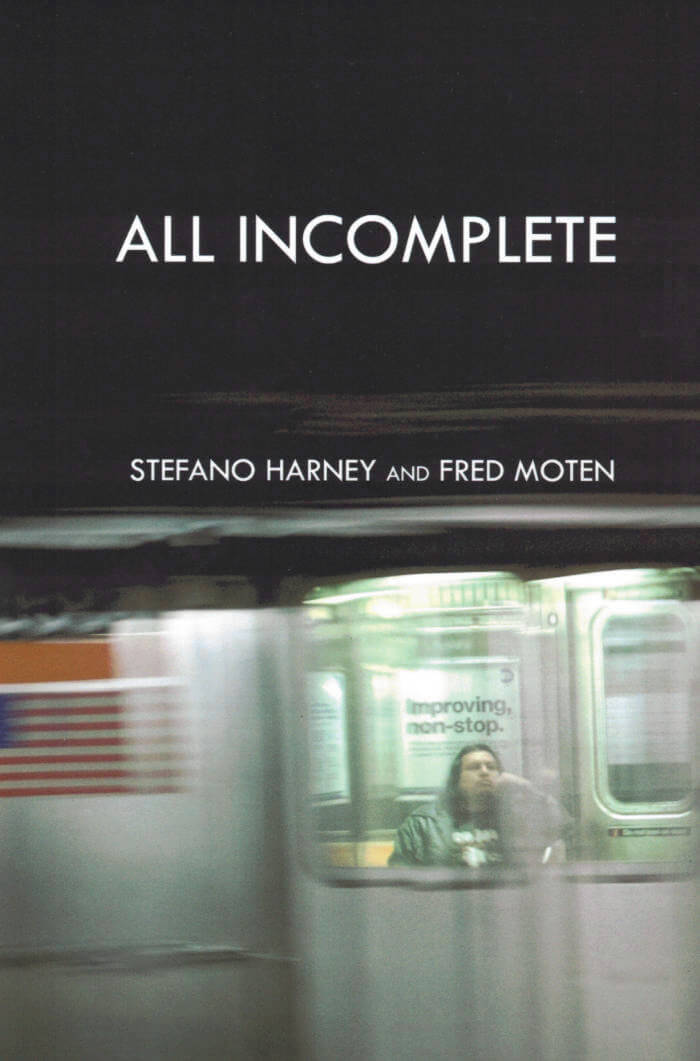
All Incomplete
Building on the ideas Harney and Moten developed in The Undercommons, All Incomplete extends the critical investigation of logistics, individuation and sovereignty. It reflects their chances to travel, listen and deepen their commitment to and claim upon partiality. All Incomplete studies the history of a preference for the force and ground and underground of social existence.
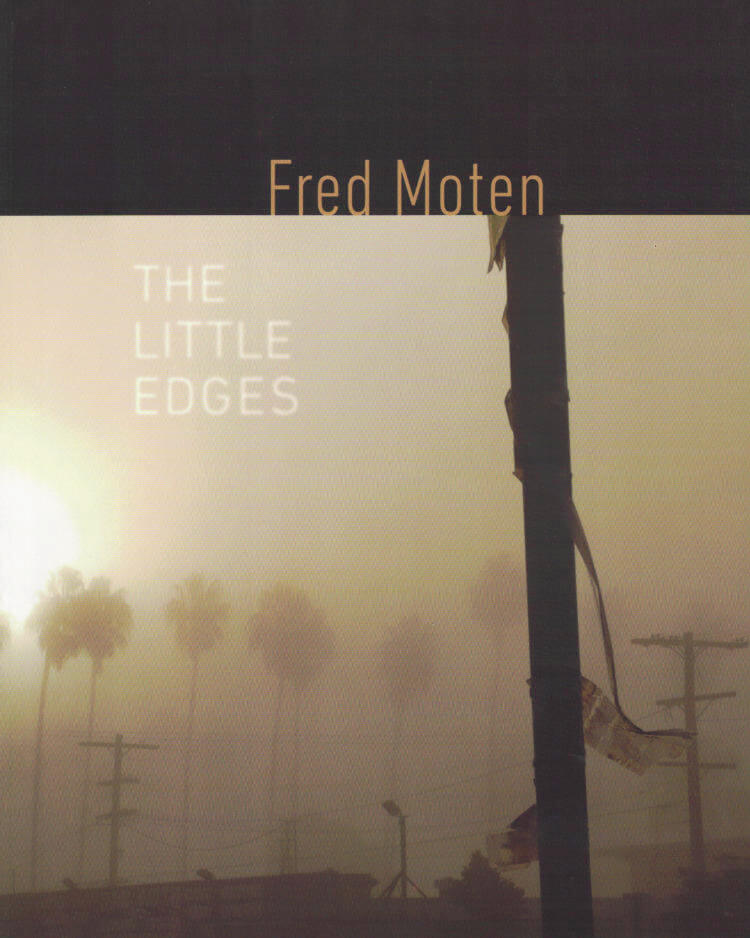
The Little Edges
The Little Edges is a collection of poems that extends poet Fred Moten's experiments in what he calls "shaped prose", a way of arranging prose in rhythmic blocks, or sometimes shards, in the interest of audio-visual patterning. Shaped prose is a form that works the "little edges" of lyric and discourse, and radiates out into the space between them. As occasional pieces, many of the poems in the book are the result of a request or commission to comment upon a work of art, or to memorialize a particular moment or person. In Moten's poems, the matter and energy of a singular event or person are transformed by their entrance into the social space that they, in turn, transform. An online reader's companion is available at http: //fredmoten.site.wesleyan.edu.
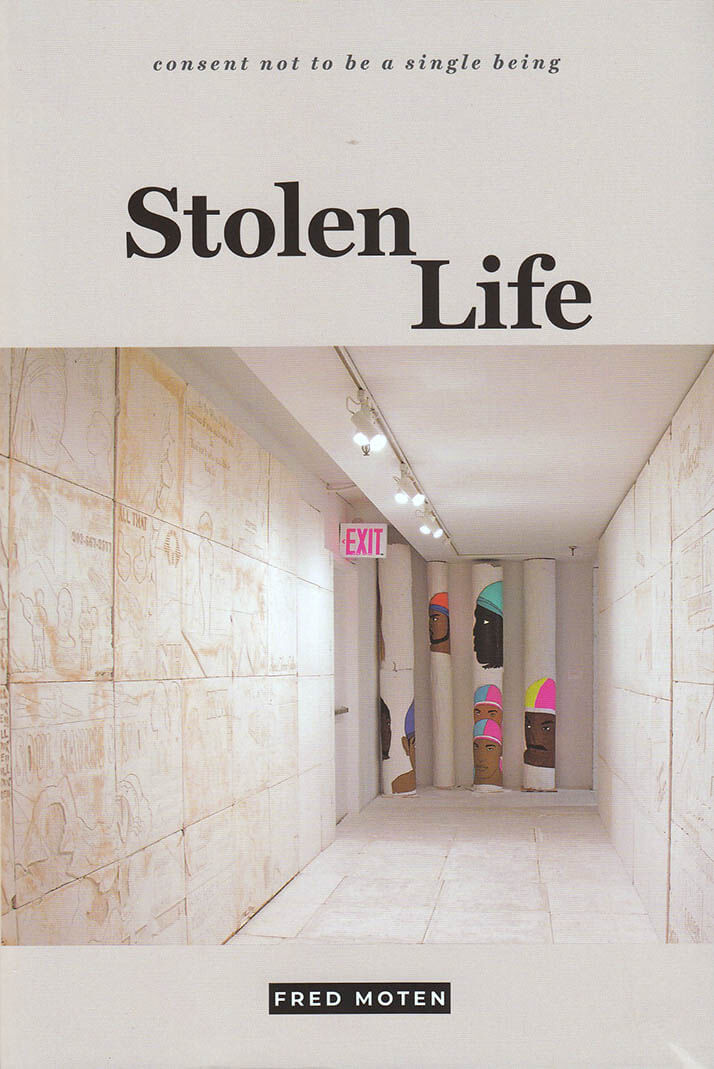
Stolen Life
In Stolen Life—the second volume in his landmark trilogy consent not to be a single being—Fred Moten undertakes an expansive exploration of blackness as it relates to black life and the collective refusal of social death. The essays resist categorization, moving from Moten's opening meditation on Kant, Olaudah Equiano, and the conditions of black thought through discussions of academic freedom, writing and pedagogy, non-neurotypicality, and uncritical notions of freedom.
Moten also models black study as a form of social life through an engagement with Fanon, Hartman, and Spillers and plumbs the distinction between blackness and black people in readings of Du Bois and Nahum Chandler. The force and creativity of Moten's criticism resonate throughout, reminding us not only of his importance as a thinker, but of the continued necessity of interrogating blackness as a form of sociality.
"2018 must go down for me as the year of Fred Moten’s trilogy: Black and Blur, Stolen Life, and The Universal Machine. You could say they’re essays about art, philosophy, blackness, and the refusal of social death, but I think of them more as a fractal universe forever inviting immersion and exploration, a living force now inhabiting my bookshelf." — Maggie Nelson, Bookforum
Fred Moten is Professor of Performance Studies at New York University and the author of Black and Blur and The Universal Machine, both also published by Duke University Press, and In the Break: The Aesthetics of the Black Radical Tradition.
Published July 2018
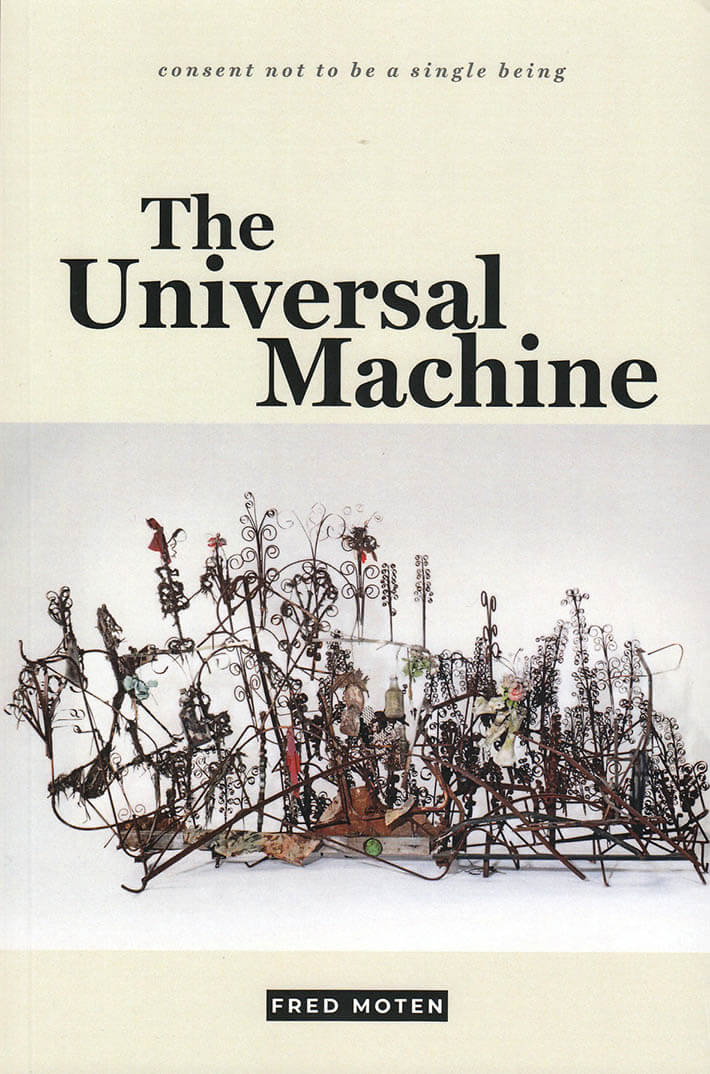
The Universal Machine
In The Universal Machine — the concluding volume to his landmark trilogy consent not to be a single being — Fred Moten presents a suite of three essays on Emmanuel Levinas, Hannah Arendt, and Frantz Fanon, in which he explores questions of freedom, capture, and selfhood. In trademark style, Moten considers these thinkers alongside artists and musicians such as William Kentridge and Curtis Mayfield while interrogating the relation between blackness and phenomenology.
Whether using Levinas's idea of escape in unintended ways, examining Arendt's antiblackness through Mayfield's virtuosic falsetto and Anthony Braxton's musical language, or showing how Fanon's form of phenomenology enables black social life, Moten formulates blackness as a way of being in the world that evades regulation. Throughout The Universal Machine—and the trilogy as a whole—Moten's theorizations of blackness will have a lasting and profound impact.
Published July 2018
Fred Moten is Professor of Performance Studies at New York University and the author of Black and Blur and Stolen Life, both also published by Duke University Press, and In the Break: The Aesthetics of the Black Radical Tradition.
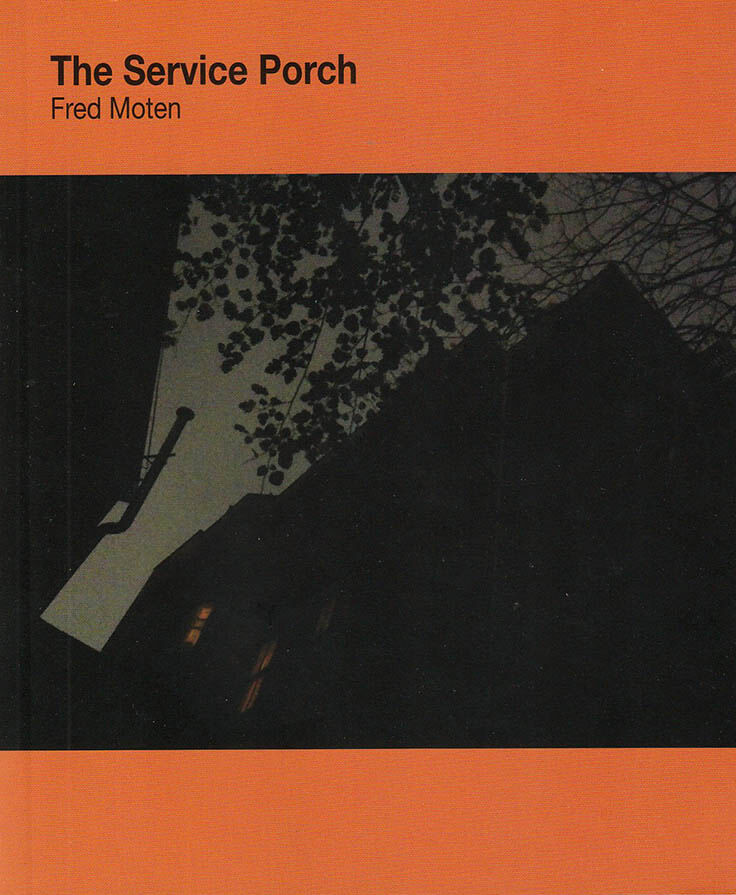
The Service Porch
The third and final volume of Fred Moten's poetic trilogy (including THE FEEL TRIO and The Little Edges), THE SERVICE PORCH is an expansive meditation on black life, love, violence, and the adventure of making art.
National Book Award-Finalist, Moten returns here to reinvent some of his earliest poetic visions and strikes up a conversation with many of the most brilliant African American visual artists through a series of epistolary and ekphrastic poems. By turns mournful, tender, ferocious, and heart-breakingly honest, THE SERVICE PORCH is an open letter, a play list, and a hive of prayer and joy.
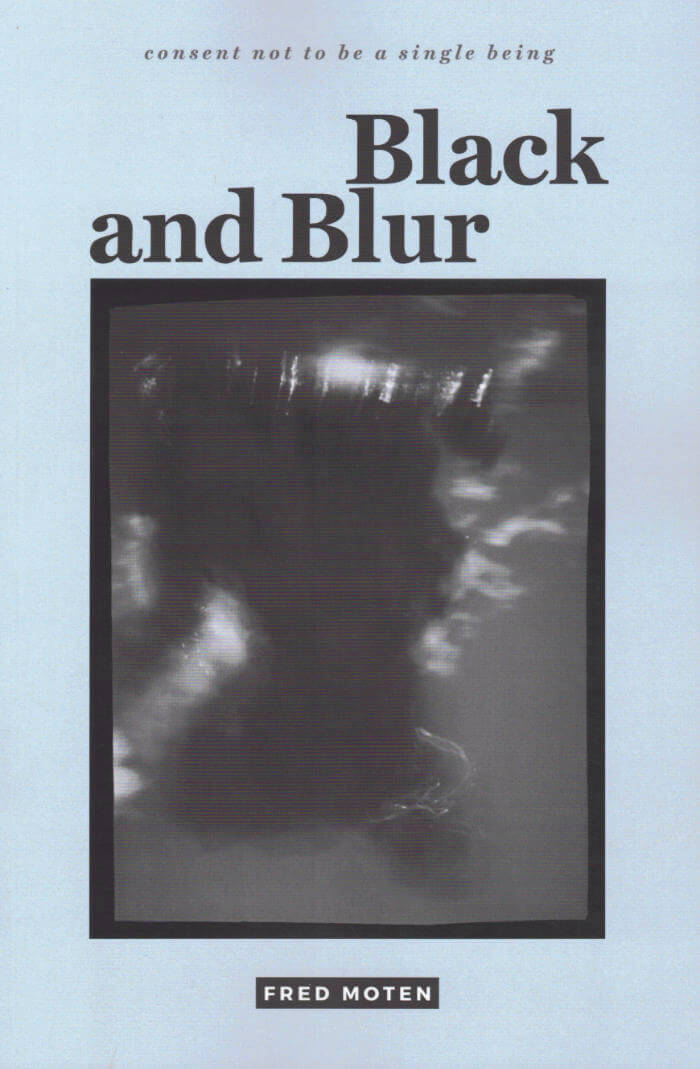
Black and Blur
In Black and Blur—the first volume in his sublime and compelling trilogy consent not to be a single being—Fred Moten engages in a capacious consideration of the place and force of blackness in African diaspora arts, politics, and life. In these interrelated essays, Moten attends to entanglement, the blurring of borders, and other practices that trouble notions of self-determination and sovereignty within political and aesthetic realms.
Black and Blur is marked by unlikely juxtapositions: Althusser informs analyses of rappers Pras and Ol' Dirty Bastard; Shakespeare encounters Stokely Carmichael; thinkers like Kant, Adorno, and José Esteban Muñoz and artists and musicians including Thornton Dial and Cecil Taylor play off each other. Moten holds that blackness encompasses a range of social, aesthetic, and theoretical insurgencies that respond to a shared modernity founded upon the sociological catastrophe of the transatlantic slave trade and settler colonialism. In so doing, he unsettles normative ways of reading, hearing, and seeing, thereby reordering the senses to create new means of knowing.
Fred Moten is Professor of Performance Studies at New York University and the author of B Jenkins, also published by Duke University Press, In the Break: The Aesthetics of the Black Radical Tradition, and coauthor of The Undercommons: Fugitive Planning & Black Study.
(Dec 2017)

All That Beauty
A pathbreaking new volume of poems from Fred Moten, All That Beauty combine's Moten's penchant for lyrical prosody, radical thought, and African American theory to produce writing unlike any other poetry in the world: "What is it to reside without settling? Is that is or is that ain't like being stuck in sweetness, held in life?"
"The line between Fred Moten’s theory and poetry is increasingly cloudy; the distinction almost seems (but isn’t quite) irrelevant. In All That Beauty, his new poetry collection, the poems come closer than ever before to the capacious, disorienting density of his prose writing: not just for their hairpin turns of speculative reasoning, or even their gleeful embrace of specialized academic terminology, but because they are strewn with names, citations and allusions that situate the text in a range of discourses – from Black studies to sound studies to the philosophy of maths." —Steven Zultanski
(Published 2019.)
And more

distinguish the limit from the edge
Theresa Hak Kyung Cha, Jimmy Robert
distinguish the limit from the edge is an intergenerational dialogue between Theresa Hak Kyung Cha and Jimmy Robert. Their connection emerges through the intersection of text and image between selected work from Cha’s oeuvre and Robert’s practice that share the formal strategies of the fold.
Robert’s work utilizes paper as a sculptural material, and his hand sometimes appears to shape the page. For Cha, the fold is present in her compositions enmeshing language through strategies of visual poetry, as in L’Image Concrete feuille L’Objet Abstrait (1976), and Untitled (après tu parti) (1976) which are both previously unpublished. The possibility of overlaying one’s work with the other, emphasised by the book’s spiral-bound double spine, and reverse fold-outs, forges an intimacy, a shared sensibility, and an encounter with the corporeal. In conversation with editor Jacob Korczynski, Robert refers to Fred Moten’s In The Break, stating, ‘Suddenly time falters. Words don’t go there. And if words don’t go there, then what does?’
distinguish the limit from the edge is commissioned by Book Works, edited by Jacob Korczynski and designed by Wolfe Hall. The book is published in association with Participant Inc. with the support of the Ministry of Culture, Sports and Tourism and Korea Arts Management Services, after the exhibition:
flipping through pages keeping a record of time: Theresa Hak Kyung Cha & Jimmy Robert curated by Jacob Korczynski at Participant Inc., 6 September – 3 November, 2024, supported by a Fall 2020 Curatorial Research Fellowship from The Andy Warhol Foundation for the Visual Arts.

Essays
Poetry as both a form and genre has many possibilities to exist within; however, poetry too often is burdened by the imperative to have an argument and a set of imagery and meanings that are preconceived and placed within the poem. In this way, poetry gets conflated with writing a thesis or project, and the poet simply the presenter of perfectly argued language. When poets attempt to bridge the gap between genres and write within the contemporary essay form, they are tasked to construct perfect arguments there as well and avoid the associative and aesthetic logic that makes poems important. The term essay itself was coined by Michel de Montaigne in the 1500s — it comes from the French word essai, which means to test or experiment with what one knows as a learning tool, and is in partial opposition to the terms we use to discuss the essay now
ESSAYS calls on thinkers and writers to move beyond this linear thinking into the realm of what an essay by someone like Montaigne might do. His essays do as they say they will—they test out ideas, they are unafraid to get messy in their execution, they are brave enough to go forward into the uncharted waters. In them, it’s completely beside the point to get back to where they started, let alone where they’d say they would go. They are simply beside the point. It’s true.
ESSAYS, edited by Dorothea Lasky, is a book of essays on the essay, which enact and query these directives. The volume collects essays by poets Ariel Goldberg, Ken Chen, Wayne Koestenbaum, Tracie Morris, Anaïs Duplan, Raquel Salas Rivera, Brandon Shimoda, Cecilia Vicuña, Fred Moten, and Mónica de la Torre.

Mu, 49 Marks of Abolition
In March 2020, Sora Y. Han learned her father was dying of cancer just as the COVID-19 pandemic arrived on California's shores. These two events led Han to introspection: “Who have I been writing to?” and “Who have I been writing for?” In her observance of the 49 days of mourning in Buddhist tradition, answers come in the form of mu – no thing, nothingness.
Han’s poetic meditations on freedom struggle come alive in the empty spaces between words, letters, and pictograms spanning her many languages—English, Korean, Chinese, jazz, law, and poetry.
Transliterating and dystranslating the writings of Fred Moten, Theresa Hak Kyung Cha, Jacques Lacan, Frantz Fanon, and others through the Korean alphabet, Han weaves the DMZ, Betty’s Case, the Thirteenth Amendment, Afro-pessimism, and psychoanalytic desire together into the open field of Bay Area radicalism. Mu is both a loving homage to and a playful subversion of political inheritances and the unsayable beyond law.
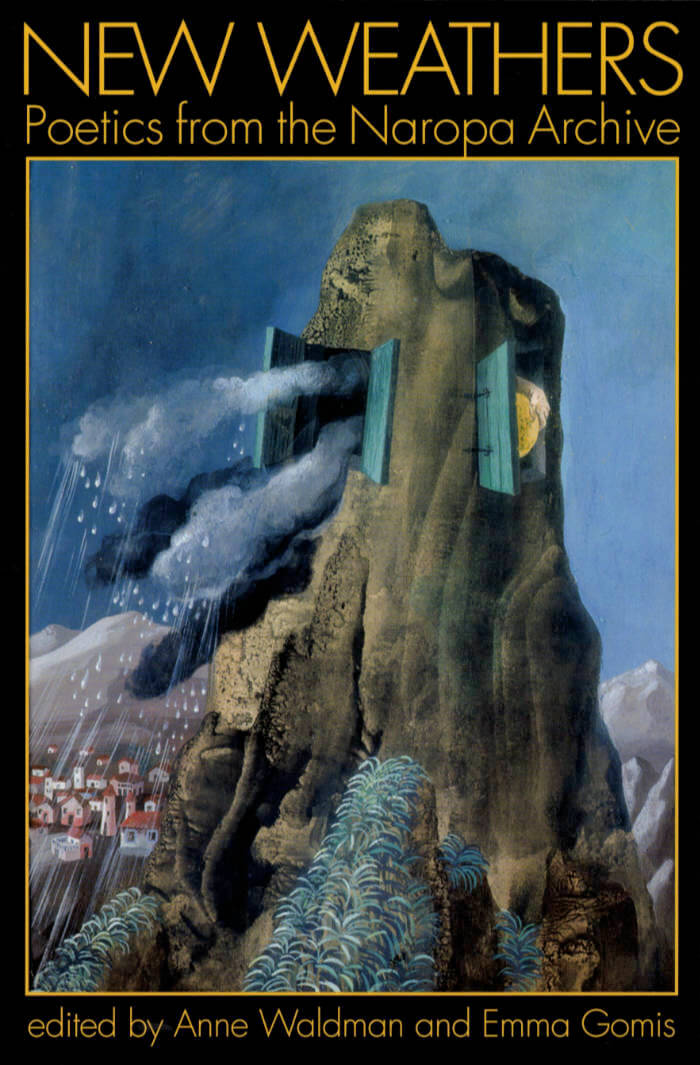
New Weathers: Poetics from the Naropa Archive: Lectures from the Naropa Archive
A collection of lectures transcribed from the audio archives of Naropa University's Summer Writing Program that represent a continuing lineage of experimental literary movements.
New Weathers asks us to consider how poetics might embolden deeper engagements with the world. Collected from the alternative education zone founded by Anne Waldman and Allen Ginsberg with the aim of opening up discourse and fostering political engagement, these texts invoke issues of gender and race-based injustice, the global climate crisis, and our possible extinction. They weave through our poetic community, the conversations we are having, the issues we are facing—our "new weathers" to posit strategies of resistance.
List of Contributors: Paula Gunn Allen, Amiri Baraka, Dan Beachy-Quick, Sherwin Bitsui, Robin Blaser, William S. Burroughs, Julie Carr, J'Lyn Chapman, Jos Charles, Jack Collom, Samuel R. Delany, kari edwards, Tongo Eisen-Martin, Tonya M. Foster, Forrest Gander, Alan Gilbert, Allen Ginsberg, Renee Gladman, Robert Glück, Lyn Hejinian, Lisa Jarnot, Kevin Killian, Thurston Moore, Fred Moten, Eileen Myles, Hoa Nguyen, Alice Notley, Akilah Oliver, M. NourbeSe Philip, Margaret Randall, Roger Reeves, Ariana Reines, Lisa Robertson, Ed Sanders, Andrew Schelling, Cedar Sigo, Eleni Sikelianos, Harry Smith, Edwin Torres, Cecilia Vicuña, Asiya Wadud, Peter Warshall, Eliot Weinberger, Peter Lamborn Wilson, and Ronaldo V. Wilson.
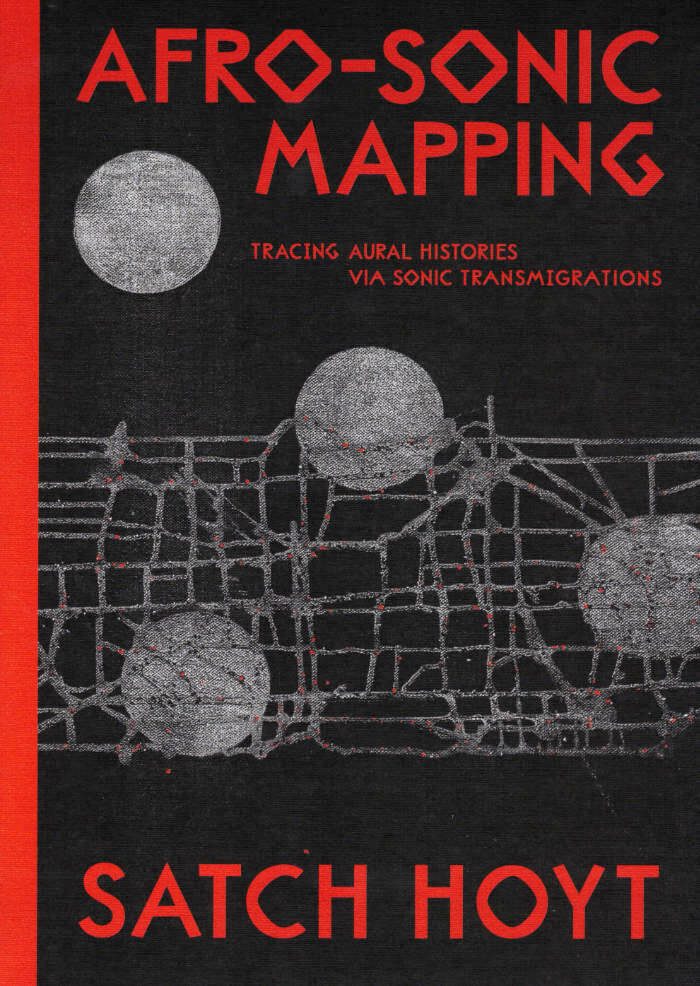
Afro-Sonic Mapping – Tracing Aural Histories via Sonic Transmigrations
An acoustic mapping of colonial history.
From his longstanding engagement to "un-mute" colonial sound collections captured during the European colonial period, Satch Hoyt's practice has been dedicated to intervene those collections and awake their sonicity, releasing phonogram recordings and instruments of different regions in Africa from the museological silence. For Hoyt, the sonic opens a portal to the acoustic mappings of history—testimonies of enslavement, resistance, empowerment and liberation, and also the amalgamations of today and the future.
For the book launch, Satch Hoyt in collaboration with Dirk Leyers performs live, intertwining historical and present recordings, vintage instruments and electronic music. By combining processed electric flute, electronic percussions, Congolese Sanzas, Brazilian Berimbau, synthesizers and recordings, Hoyt uncoveres layers of diasporic experience, reimagining memories of the African Diaspora from contemporary and future spaces in which, as Hoyt stays in the book, "the recorded past becomes the present".
"Imagine a counter-journey through a multi-media mixing board of Afro-Sonic resistance beginning on the Southwest coast of Africa in 1483 and playing back live the layered improvisations of Angolan musicians and artists from the Congo, Angola, Brazil, and Portugal. With breathtaking scope, Satch Hoyt has scrambled the signals of settlers and colonial theft. He chronicles here his archival research and exuberant artistic collaborations across a map of Afro-sensibility that resoundingly displays that culture is a living activity and a practice of creative hospitality and ultimately, the jam". —Tsitsi Jaji, author of Africa in Stereo: Music, Modernism, and Pan-African Solidarity (2014)
Contributions by Satch Hoyt, Anselm Franke, Paz Guevara, Louis Chude-Sokei, Sofia Lemos, Fred Moten, Greg Tate, Jihan El-Tahri, Kiluanji Kia Henda, MC Sacerdote, Khris, Suzana Sousa, Benjamin Sabby, ÀRÀKÁ collective, Alberto Pitta, Denise Ferreira da Silva, Rui Vieira Nery.
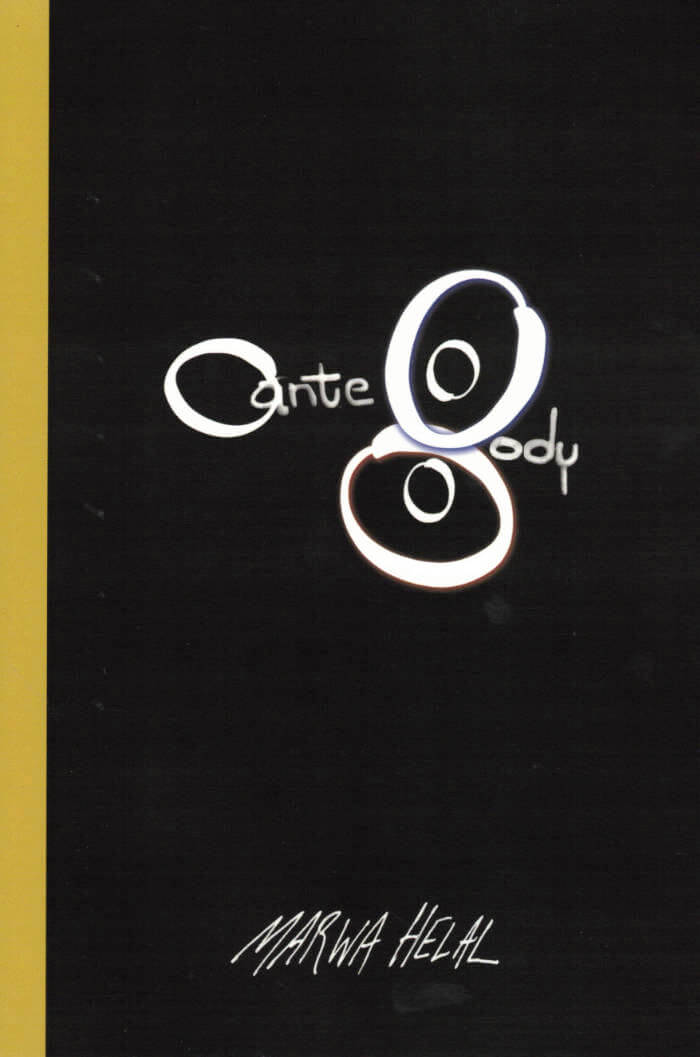
Ante body
An incisive poetic sequence that tracks the relationship between migration and complex traumas in this unsparing critique of the unjust conditions that brought us the global pandemic.
Ante body is a poetics of [un]rest. A project that started as an exploration of how the psychological impacts of migration and complex traumas manifest as autoimmune disease and grew into a critique of the ongoing unjust conditions that brought on the global pandemic. Continuing her use of the invented poetic form, the Arabic, and integrating Fred Moten's concept of "the ANTE," Helal creates an elliptical reading experience in which content and form interrogate the inner workings of patriarchy, capitalism, nationalism, and globalism.
Marwa Helal is the author of Ante body (Nightboat Books, 2022), Invasive species (Nightboat Books, 2019) and the chapbook I AM MADE TO LEAVE I AM MADE TO RETURN (No, Dear, 2017).

What Is Poetry? (Just Kidding, I Know You Know)
A selection of interviews and rare photos from the legendary St. Mark's Poetry Project for its 50th anniversary season.
The Poetry Project at St. Mark's Church was founded in 1966 for the overlapping circles of poets in the Lower East Side of New York. These interviews from The Poetry Project Newsletter form a kind of conversation over time between some of the late 20th century's most influential poets and artists, who have come together in this legendary venue over the past 50 years.
Includes interviews with Charles North, Anne Waldman, Bernadette Mayer, David Rattray, Allen Ginsberg, Kenneth Koch, Harryette Mullen, Barbara Henning, David Henderson, Lisa Jarnot, Alice Notley, Ed Sanders, Samuel Delany, Harry Matthews, Victor Hernandez Cruz, Renee Gladman, Lorenzo Thomas, Fred Moten, Stan Brakhage, Alex Katz, Lewis Warsh, Ron Padgett, Maggie Nelson, Wayne Koestenbaum, Eileen Myles, and more.
"I find it one of the liveliest points of communication in the American poetry world. There is an incredible excitement to come to the church and read one's poems to the many other poets who congregate there, drawn to the church by its own energy and thrust."—Donald Hall
From the introduction, by Anselm Berrigan: "For the poets closely involved with the Poetry Project since, and subsequent to, its inception, the interviews were an opportunity to speak directly to a community one could perceive as known, imaginary, expanding, unwieldy, intermittent, formative, desperately necessary, and sometimes peculiarly unsatisfying all at once. Community being the kind of term that often implies everything and nothing simultaneously, with the bottom falling out of the word depending on who happens to be wielding it. Poets can be particularly adept at using and exposing such terms."
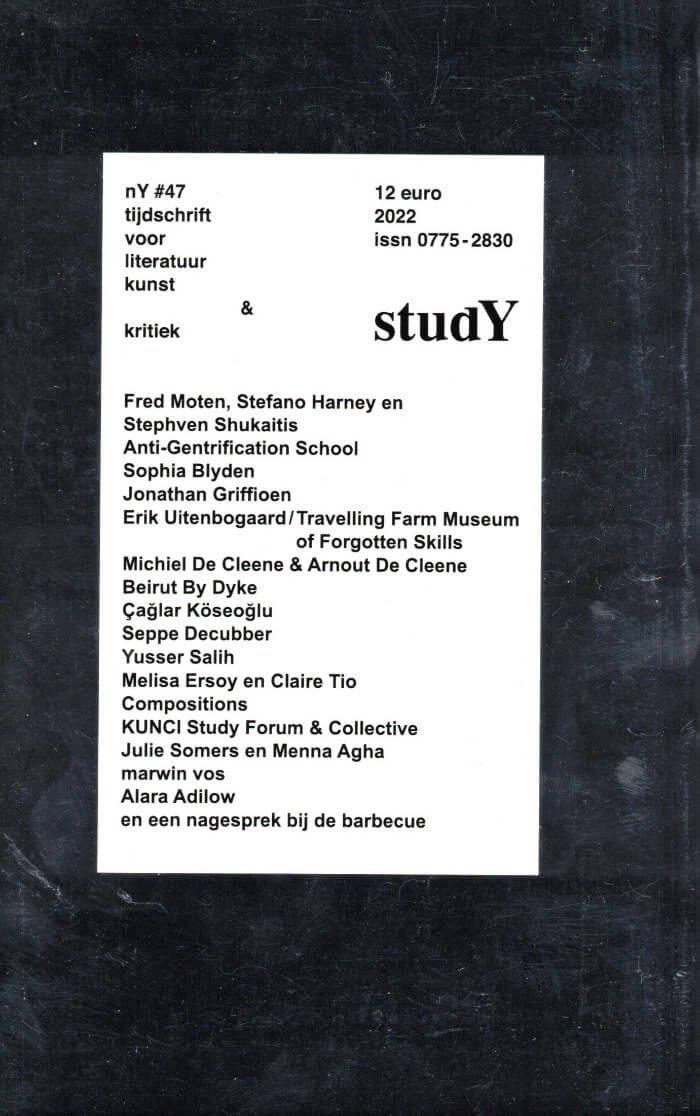
nY47 — studY
nY47 over studY verzamelt theoretische reflecties en praktijken rond of over study, geïnspireerd op het werk van Fred Moten en Stefano Harney. We vatten dit op als een praktijk van samenkomen om na te denken over wat je samen wilt leren, zonder dat hier een duidelijk einddoel aan verbonden is, zonder dat je er individueel punten voor of andere voordelen voor behaalt – zonder een instrumentele logica, kortom.
Redactie: Lietje Bauwens, Persis Bekkering, Hans Demeyer, Dagmar Bosma, Frank Keizer, Çağlar Köseoğlu, Julie Somers, Nadia de Vries.

Xenogenesis
An extensive and comprehensive polyphonic exploration of the work of The Otolith Group, coming at a pivotal point in their practice.
The work of this London-based artist's collective comprised of Anjalika Sagar and Kodwo Eshun covers politics of race and diversity and incorporates film making and post-lens-based essayistic aesthetics that explore the temporal anomalies, anthropic inversions, and synthetic alienation of the posthuman, the inhuman, the non-human, and the complexity of the environmental conditions of life we all face.
Presenting all bodies of work contained in the Xenogenesis exhibition, this publication includes many materials and graphics from The Otolith Group's broader practice, including performance, lecture and research material. The outcome of over four years of collaboration, research and conversation, the publication is not a chronological exhibition catalogue or retrospective but a cross-section of their work which includes substantial contributions from the artists themselves, in the form of writing and direct engagement with its production.
The publication also brings together important thinkers, scholars, art historians and writers from disparate fields, who know and have worked with the group, as well as those who are writing from a contemporary perspective. They include Denise Ferreira da Silva, Annie Fletcher, Anselm Franke, Shanay Jhaveri, George E. Lewis, Mahan Moalemi, Fred Moten, Grant Watson, Vivian Ziherl and the late Mark Fisher each of whom reflect on a particular aspect of the Group's practice with supplementary materials such as archival images, documented conversations, early lecture performances as well as other accompanying texts and examinations of their research sites.

Cruiser L'Utopie
First French translation of José Esteban Muñoz's field defining work—an intellectual inspiration for a generation of LGBTQ scholars.
Cruiser l'utopie describes a movement, a drifting advance between theory, philosophy, art criticism and personal narrative. The works cited, narrated, are mixed with family or individual narrative and more academic considerations. This practice of queer theory and aesthetics is part of a new interpretation of hope as perceived by philosopher Ernst Bloch, articulated with black radical thought and the poetic research of authors such as Fred Moten and Eileen Myles.
Muñoz focuses here on the period of the Stonewall revolts (New York, 1969) and analyzes, for example, the works of Frank O'Hara, King Jone/Amiri Baraka, Andy Warhol, Kevin Avance, Samuel R. Delany, Fred Herko, Jill Johnston, Ray Johnson. Queer theory as a study has a new way of researching and writing, a form of hybridity between philosophy and cultural studies. The critique is, as if by anticipation, contained in the counter-normative artistic practice and daily life whose narratives, both subjective and historical, hint at a queer future, a place of transformation and liberation.
The text, translated from English by Alice Wambergue, is accompanied by a preface by Elisabeth Lebovici and a poem by Fred Moten.
José Esteban Muñoz (1967 - 2013) is a queer scholar and art theorist. Author of The Sense of Brown (published posthumously in 2020), Cruising Utopia, the Aftermath and Elsewhere of Queer Advent (2009), and Disidentifications: Queers of Color and the Performance of Politics (1999), he edited the collective works Pop Out: Queer Warhol (1996) and Everynight Life: Culture and Dance in Latin/o America (1997). Muñoz has long taught in the Department of Performance Studies at New York University's Tisch School of the Arts and edited the Sexual Cultures series at New University Press, where he has published works such as Jack Halberstam and Samuel Delany.
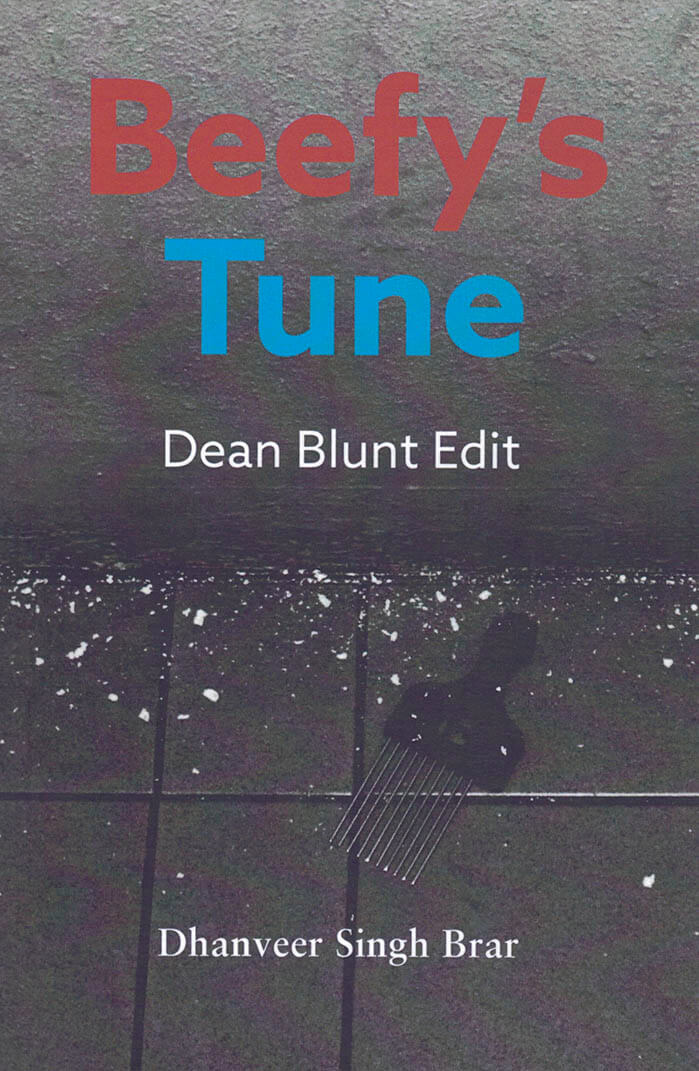
Beefy's Tune (Dean Blunt Edit)
Dean Blunt is one of the most important British artist of the current century because he fundamentally does not care about Britain. His importance makes it shocking that such little critical attention has been paid to his work. His indifference explains it.
Dhanveer Singh Brar’s ‘Beefy’s Tune (Dean Blunt Edit)’ looks to initiate a conversation that needs to be had about Dean Blunt, about Britain (through Blunt’s indifference to it), and about Blackness in Britain (through the depth and complexity of Blunt’s feeling for it). Using the 2016 album ‘BBF Hosted By DJ Escrow’ as a means of navigation, Brar hears Blunt in order to access the long contested dream of Britain’s disappearance that was conducted under the name of Black British Arts. Partial (in the sense of his relation to Blunt) and partial (in the sense of unfinished), ‘Beefy’s Tune (Dean Blunt Edit)’ see’s Dhanveer Singh Brar give the dream a grammar, if not a name.
Dhanveer Singh Brar is a theorist and scholar who teaches in the Department of Visual Cultures at Goldsmiths, University of London. His is a member of Le Mardi Gras Listening Collective and Lovers Discourse. Brar’s second book ‘Teklife, Ghettoville, Eski: The Sonic Ecologies of Black Music in the Early Twenty-First Century’ will be published by Goldsmiths Press/MIT Press in Spring 2021
"To encounter BBF Hosted by DJ Escrow through Dhanveer Brar’s ears is to see Babylon through his eyes, and to sense Britain—to uncover with 'accuracy, brutality and beauty' the complexities of its meaning—through the social music, social vision and social feel of those who refuse the Britishness that is withheld from them. Brar discerns Dean Blunt’s rightful place in a cultural field where critical discourse and sonic dream are fundaments of a dub university curriculum whose various approaches show the absolute necessity and generativity of stealth, flaw and the resistance to category. Blunt’s “love letter to the blackness of Hackney” deserves the most rigorous, gentle, erudite attention. Happily, Dhanveer Brar is here to provide it." – Fred Moten.
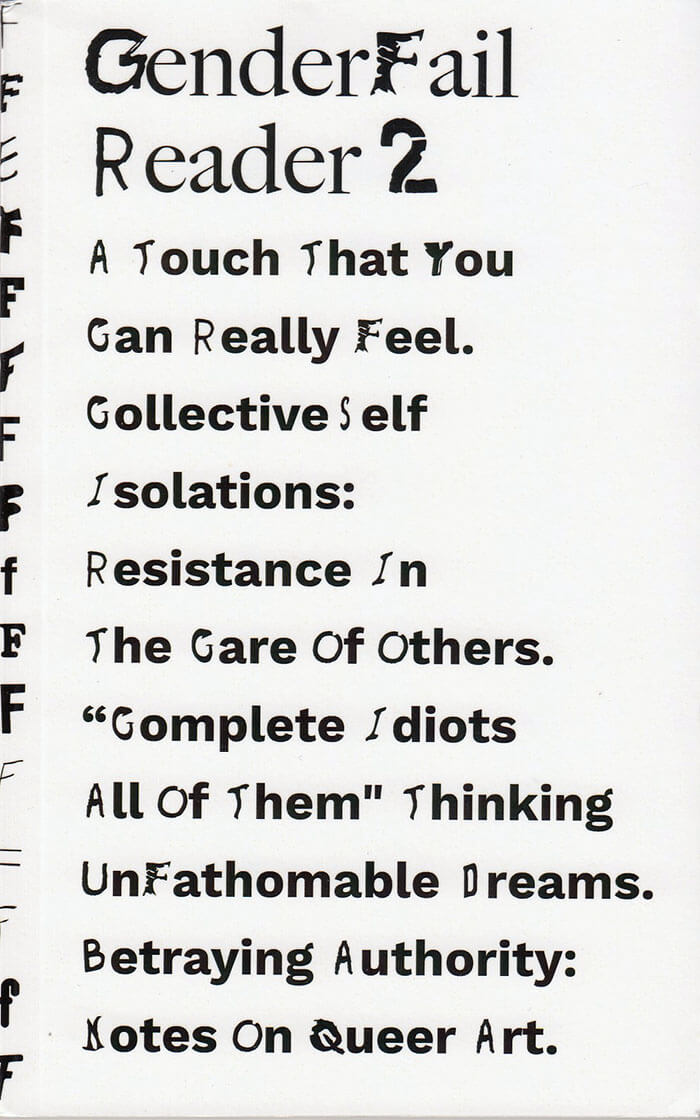
GF Reader 2
GenderFail Reader 2 is a compilation of four brand new essays written during the pandemic including Small Publishing and Finding Ways to Live, A Touch that You Can Really Feel, Collective Self Isolations: Resistance in the Care of Others and the Violence of Naming. This second printing also has a new essay “Complete Idiots All of Them: Thinking UnFathomable Dreams.
This reader also includes three new poems, Being an Instrument, Douche and Making Friends at 30, by my partner Noah LeBien, who as become such an important collaborator through my work with GenderFail. Noah also expanded their essay, Betraying Authority: Notes on Queer Art that was previously published as a zine.”
Be Oakley, (formally known as Brett Suemnicht) Born 1991 in Clearwater, Florida; is an writer, facilitator and publisher based in Brooklyn, NY. Oakley's projects looks to what Fred Moten calls "the politics of the mess" by framing their identity as a white non-binary queer person in its intersections with failure and internationality. In 2015 they started GenderFail, a publishing and programming initiative that seeks to encourage projects that foster an intersectional queer subjectivity. Their work has been shown in programs and exhibitions at MoMA PS1 (NYC), the Studio Museum of Harlem, The International Center of Photography (NYC), Vox Populi and Sediment Arts. Their publications can be found in the library collections of The Museum of Modern Art, The Whitney Museum, The Met Museum, The Center for Book Arts and many others.
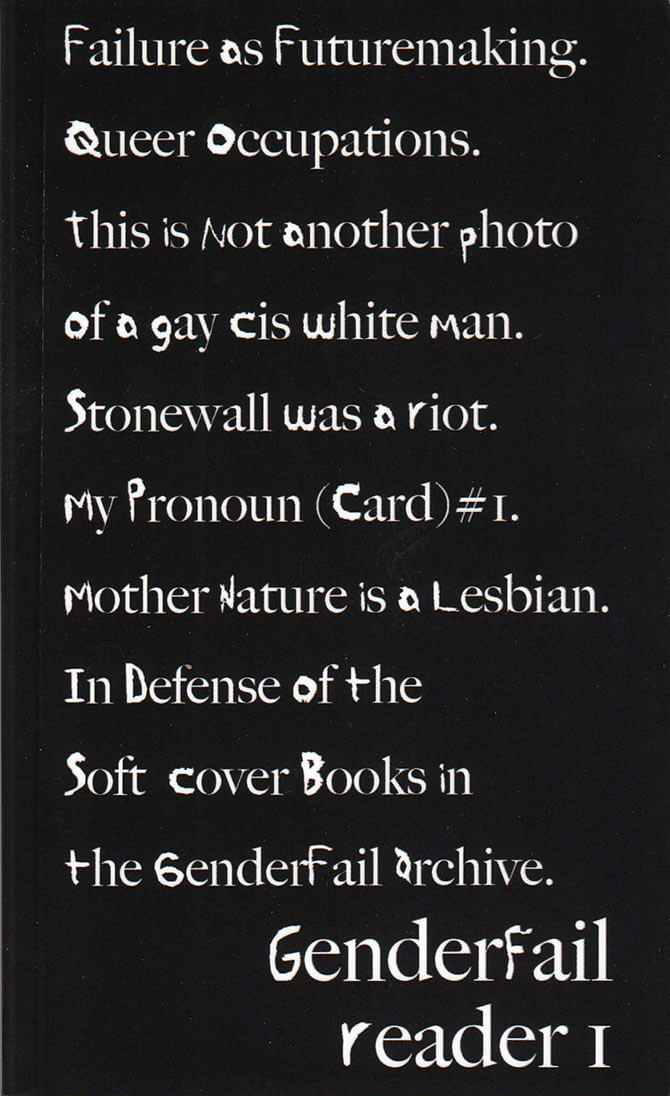
GF Reader 1
GF Reader 1 is a complication of six essays by GenderFail founder Be Oakley complied together for the first time. This publication features previous released essays from GF titles including Stonewall was a Riot, This is not another photo of a cis gay white men, My Pronoun (Card) #1 and In Defense of the Softcover Books in the GenderFail Archive. The GF Reader also includes Failure as Futuremaking, a new manifesto written in collaboration with artist Noah LeBien.
Be Oakley, (formally known as Brett Suemnicht) Born 1991 in Clearwater, Florida; is an writer, facilitator and publisher based in Brooklyn, NY. Oakley's projects looks to what Fred Moten calls "the politics of the mess" by framing their identity as a white non-binary queer person in its intersections with failure and internationality. In 2015 they started GenderFail, a publishing and programming initiative that seeks to encourage projects that foster an intersectional queer subjectivity. Their work has been shown in programs and exhibitions at MoMA PS1 (NYC), the Studio Museum of Harlem, The International Center of Photography (NYC), Vox Populi and Sediment Arts. Their publications can be found in the library collections of The Museum of Modern Art, The Whitney Museum, The Met Museum, The Center for Book Arts and many others.
Edition of 100.

The Hundreds
Kathleen Stewart, Laurent Berlant
In The Hundreds Lauren Berlant and Kathleen Stewart speculate on writing, affect, politics, and attention to processes of world-making.
The experiment of the one hundred word constraint, each piece is one hundred or multiples of one hundred words long, amplifies the resonance of things that are happening in atmospheres, rhythms of encounter, and scenes that shift the social and conceptual ground.
What's an encounter with anything once it's seen as an incitement to composition? What's a concept or a theory if they're no longer seen as a truth effect, but a training in absorption, attention, and framing?
The Hundreds includes four indexes in which Andrew Causey, Susan Lepselter, Fred Moten, and Stephen Muecke each respond with their own compositional, conceptual, and formal staging of the worlds of the book.